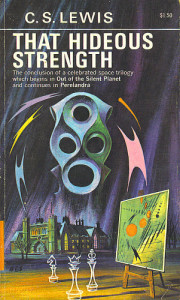 One doesn’t normally think of C. S. Lewis as a political scientist; neither would he have relished the title. Yet while he rarely enters into any deep discussion of politics and government, he had definite views on both. All one has to do is read the last entry of his science fiction trilogy, That Hideous Strength, to see his utter distaste for any government that thinks its purpose is to control the lives of all citizens. That novel offers a dark portrait of where absolute control will take us as a society. It also shows God’s disdain for the arrogance of man.
One doesn’t normally think of C. S. Lewis as a political scientist; neither would he have relished the title. Yet while he rarely enters into any deep discussion of politics and government, he had definite views on both. All one has to do is read the last entry of his science fiction trilogy, That Hideous Strength, to see his utter distaste for any government that thinks its purpose is to control the lives of all citizens. That novel offers a dark portrait of where absolute control will take us as a society. It also shows God’s disdain for the arrogance of man.
Even in his classic Mere Christianity, Lewis touches on this:
It is easy to think the State has a lot of different objects—military, political, economic, and what not. But in a way things are much simpler than that. The State exists simply to promote and to protect the ordinary happiness of human beings in this life.
A husband and wife chatting over a fire, a couple of friends having a game of darts in a pub, a man reading a book in his own room or digging in his own garden—that is what the State is there for. And unless they are helping to increase and prolong such moments, all the laws, parliaments, armies, courts, police, economics, etc., are simply a waste of time.
Notice he didn’t say the State makes you happy, nor that it tells the husband and wife what type of fire they’re allowed to build for their chat, nor how many dartboards are permitted in the pub, nor which books the man should read, nor whether he can even have a garden of his own. It is understood those are all personal choices; the role of government is to make sure we are free to enjoy them. The Nanny State didn’t mesh with Lewis’s vision of good government, and neither should it be our goal.
And if you’ve never read That Hideous Strength, I would urge you to check it out.
